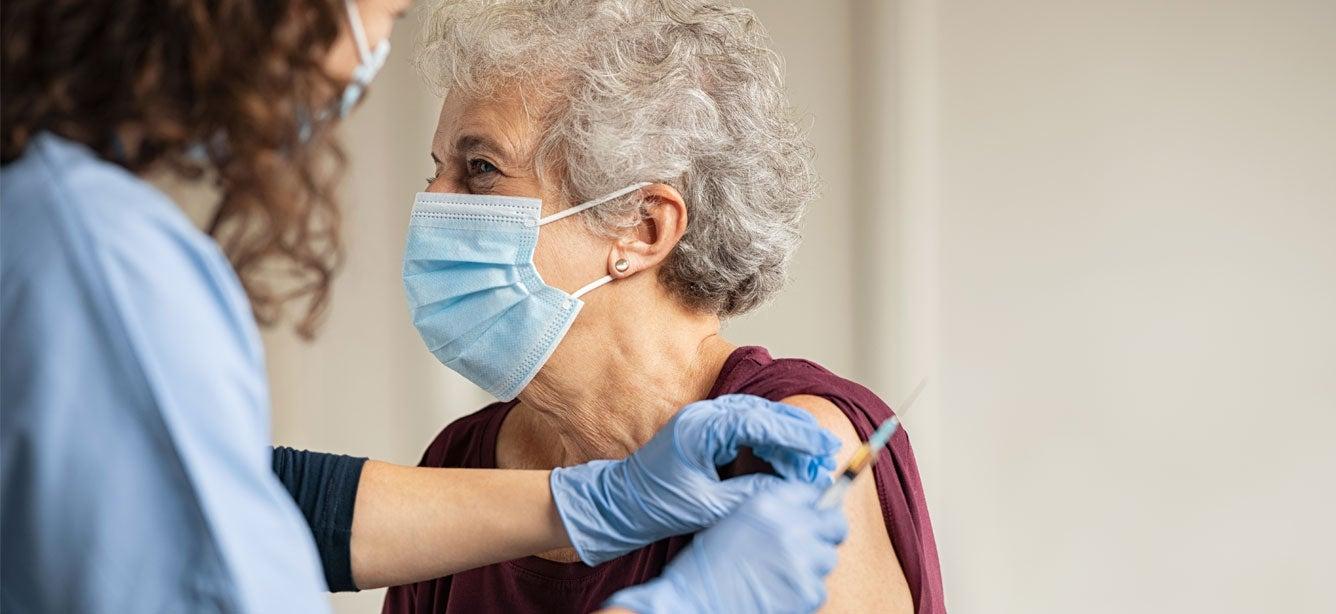
Scientists have proven that cooler temperatures weaken our immune system, making us more susceptible to illness and infection. Additionally, cooler weather toughens the outer shell of viruses, making it easier for them to travel from person to person. The immune system naturally weakens with age, which means winter can be even more dangerous for older adults.
Here’s a list of four vaccines that Medicare helps pay for and that you should talk with your doctor about to help protect yourself from illness.
Influenza Vaccine
- What is the flu? The flu—or influenza—is a contagious respiratory illness that can be severe and life-threatening.
- Why is it important for older adults to get the flu shot? Older adults—even if you are healthy—are at higher risk when it comes to the flu due to age-related weakening of our immune systems, making it more difficult for us to fight off disease. For the 86 percent of adults 65+ who are managing a chronic condition—like diabetes or heart disease—the flu can be even more dangerous because you are more likely to develop complications or become hospitalized. Flu combined with pneumonia—a common acute condition among the aging population—is one of the top 10 causes of death for those aged 65+ in the U.S. And while they are similiarities between the flu and COVID-19, one the most important differences is that there is a vaccine to protect against the flu. There currently isn't a vaccine for COVID-19. According to the Centers for Disease Control and Prevention (CDC), the flu vaccination is the best way to prevent the flu. To address the increased risks faced by the aging population, a higher-dose version of the flu vaccine was created specifically for older adults – talk to your doctor today about this option.
- When should you get the flu shot? You should get a flu shot annually. For older adults, it’s best that you get your vaccine as early in the season as possible to prevent contracting the flu from a loved one, caregiver, or friend. Flu season in the U.S. typically peaks between November and March, meaning it’s vital for you to get your shot before the holidays start. It’s important to note that it does take two weeks after getting the shot for your body to build up full immunity.
- Where can you get the flu shot? Your best option for getting the flu shot is to make an appointment with your physician. You can also visit your local clinic or drug store to receive the shot, but it’s a good idea to call ahead as some locations do run out of the vaccine. Use the Flu Vaccine Locator to find all locations near you that offer the flu vaccine.
- How does Medicare cover the cost of the flu shot? The flu vaccine is a once a year, cost-free Medicare Part B benefit. For Original Medicare, you must use a physician or healthcare provider who accepts Medicare, and for Medicare Advantage, you may have to use an in-network doctor or pharmacy.
Shingles Vaccine
- What is shingles? Shingles is a painful skin rash that’s caused by the same virus responsible for chickenpox. Shingles is less contagious than chickenpox, and can only be passed on to another person up until the point when the infected person’s blisters begin to scab. Even after shingles passes, long-term pain can linger.
- Why is it important for older adults to get the shingles vaccine? Researchers believe that the age-related weakening of our immune systems can trigger the “reawakening” of the dormant chickenpox virus. One in three adults contracts shingles at some point in their life—the majority of whom are 60 years or older—and the older you are when you get shingles, the more likely you are to have severe side effects, like fever, exhaustion, and loss of appetite. These can lead to malnutrition, physical deterioration, and/or additional infections. Whether you remember having chickenpox as a child or not, you should still talk to your doctor about getting vaccinated.
- When should you get the shingles vaccine? Older adults are at higher risk for developing shingles, since our bodies have more trouble fighting off infections as we age. The Centers for Disease Control and Prevention (CDC) recommends that healthy adults age 50 years and older get two doses of Shingrix separated by two to six months. Vaccination is also recommended for some adults age 19 and older who have compromised immune systems. People who are immunocompromised can receive their second dose of Shingrix one to two months after the first dose.
- Note: Shingrix replaced the prior shingles vaccine Zostavax and has been the only shingles vaccine available in the U.S. since November 2020. If you had the Zostavax vaccine previously, you should still get the Shingrix shot. Talk to your health care provider about the best timing to get Shingrix.
- Where can you get the shingles vaccine? Your physician or local pharmacy can administer the shingles vaccine. To search for a local clinic or pharmacy, check out the Vaccine Locator.
- Does Medicare cover the cost of the shingles vaccine? Medicare covers a wide range of preventive services, including Shingrix. Due to the Inflation Reduction Act, there is now no cost-sharing for all adult vaccines covered under Part D that are recommended by the Advisory Committee on Immunization Practices, including Shingrix. With Medicare, you should pay nothing out of pocket when you receive this vaccination. If you don’t have Medicare, call your health insurance plan in advance to see if they will cover the cost of the Shingrix vaccine.
Pneumococcal Vaccine
- What is pneumococcal disease? Pneumococcal disease causes severe infections throughout the bloodstream and/or key organs. While you may not have heard of pneumococcal disease, you have probably heard of the conditions that result from this disease, including pneumonia (infection of the lungs), meningitis (infection of the lining of the brain and spinal cord), and bacteremia (infection of the bloodstream). Pneumococcal disease can result in deafness, brain damage, loss of limbs, and even death.
- Why is it important for older adults to get the pneumococcal vaccine? Pneumococcal disease kills 18,000 adults 65+ each year. A weakening immune system means that older adults are at greater risk, and can face more severe side effects, especially those who are managing chronic diseases.
- When should you get the pneumococcal vaccine? The pneumococcal vaccine—you may hear people call it the pneumonia vaccine—is actually two shots given about a year apart. Check with your doctor to see if you’ve had either shot already.
- Where can you get the pneumococcal vaccine? You can usually make an appointment with your doctor to receive the vaccine, or visit your local clinic or pharmacy. Check out the HealthMap Vaccine Finder to find all locations near you that offer the vaccine.
- How does Medicare cover the cost of the pneumococcal vaccine? The pneumococcal vaccine is a cost-free benefit covered by Medicare Part B. For Original Medicare, you must use a physician or healthcare provider who accepts Medicare, and for Medicare Advantage, you may have to use an in-network doctor or pharmacy.
Hepatitis B Vaccine
- What is the hepatitis B virus? Hepatitis B (or hep B) is a contagious virus that infects the liver. Acute hep B, which usually lasts a few weeks, often mimicks symptoms similar to the flu, like fever and nausea. Chronic hep B is long-term, often has no symptoms at all, and can cause liver damage or death.
- Why is it important for older adults to get the hepatitis B vaccine? The liver and its function change as you age, making hep B more prevalent among older adults. Your risk of contracting hepatitis B increases if you have hemophilia, end-stage renal disease (ESRD), diabetes, or other conditions that lower resistance to infection. Acute hep B is particularly dangerous for older adults because there is no specific treatment for the symptoms.
- When should you get the hepatitis B vaccine? The hepatitis B vaccine is a series of three or four injections received over six months. Most Americans are vaccinated against hepatitis B as infants. If you are not sure if you’ve been vaccinated or if you are in a situation where you may need to update your vaccination, contact your doctor immediately.
- Where can you get the hepatitis B vaccine? Your doctor, a local clinic or a drug store can administer the vaccine. Use the Adult Vaccine Finder to find a location in your community.
- How does Medicare cover the cost of the hepatitis B vaccine? Medicare Part B insurance covers the full cost of the hep B vaccine if (A) a doctor determines that you are at high or medium risk of contracting the hep B virus, and (B) the physician or healthcare provider administering the vaccine accepts Medicare. Consult your doctor to determine your risk of getting hep B.
Make a plan to get vaccinated today
Getting these vaccines and a COVID-19 booster (also covered by Medicare) is an important part of healthy aging, and they also help ensure the health of your friends and family. Call your doctor today to see if these vaccines are right for your health, and then check with your Medicare provider about where you can get them. If you know someone who may not be vaccinated, share this information with them so they can take the next step toward protecting themselves.
This article, originally published on Nov. 24, 2020, was updated on Dec. 7, 2022, to reflect new Medicare coverage of the shingles vaccine effective January 2023. Medicare also covers COVID-19 vaccinations.



